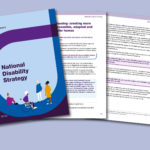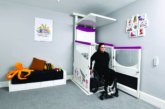Habinteg Housing Association has responded to the publication of the National Disability Strategy, saying government has missed a golden opportunity to make immediate changes to the Building Regulations and increase the minimum accessibility requirements for all new homes.
On the 28th July, the Government published their National Disability Strategy with the stated aim of improving the everyday lives of disabled people. The strategy sets out aims to address disabled people’s housing needs as well as other themes including transport, employment, education, shopping leisure and public services.
Habinteg want to see the Building Regulations ‘accessible and adaptable’ standard established as the minimum requirement for all new homes as well as a national expectation for a proportion of all homes to be built to wheelchair accessible standards. However the strategy stops short of these steps. Instead, it commits the Ministry of Housing Community and Local Government to:
- Confirm plans to improve the framework to deliver accessible new homes by December 2021.
- Commission new research to develop statutory guidance on meeting Building Regulations covering access to and use of buildings.
Kerry Thompson, an award winning disability campaigner, wheelchair user and Habinteg tenant said: “It’s so disappointing that the Government has missed the opportunity to make a firm joined up link between accessible homes and other key policy areas. Without accessible homes disabled people are held back from ‘levelling up’ in so many ways. It’s harder to work, to raise a family, to study or even just build relationships with neighbours and friends.
“These are all basic things that most non-disabled people don’t think twice about.
“The Government’s own figures show that the number of people who want to move to find somewhere more accessible is increasing. At the same time, there are 400,000 wheelchair users living in homes that are neither adapted nor designed to be accessible.
“It’s simply not ok that so many people are making do in unsuitable homes. If we’re serious about equality and inclusion this must change now before it’s too late.”
Nick, Apetroaie Habinteg Chief Executive commented: “Despite the strategy setting out ambitions to tackle inequality, we believe it’s missed an opportunity to make immediate and straightforward changes to Building Regulations. Increasing the minimum accessibility requirements for all new homes would have made thousands more homes that are easy to adapt when needed and ensure that an adequate level of inclusive design is provided in all new developments.
“The case for change is simple and we don’t believe it’s enough to plan for more research. Every year’s delay means thousands more homes being built that are not inclusive or accessible for disabled people.”
Other housing commitments set out in the strategy include:
- Enacting aspects of the Equality Act 2010 which require private landlords to allow adaptations to shared areas of their buildings to improve access for disabled tenants.
- Allocating funds to deliver more affordable supported housing.
- Making improvements to the administration of Disabled Facilities Grants.
- Ensuring the safety of disable people in buildings during emergencies.
- Habinteg believes that adequate housing is fundamental to inclusion and equality for disabled people.
Home is the starting point for every day, whether that be a day of work, study, parenting, volunteering or leisure. Yet currently only 9% of homes in England offer even the most basic level of accessibility and this puts disabled people at a severe disadvantage in all aspects of life.









